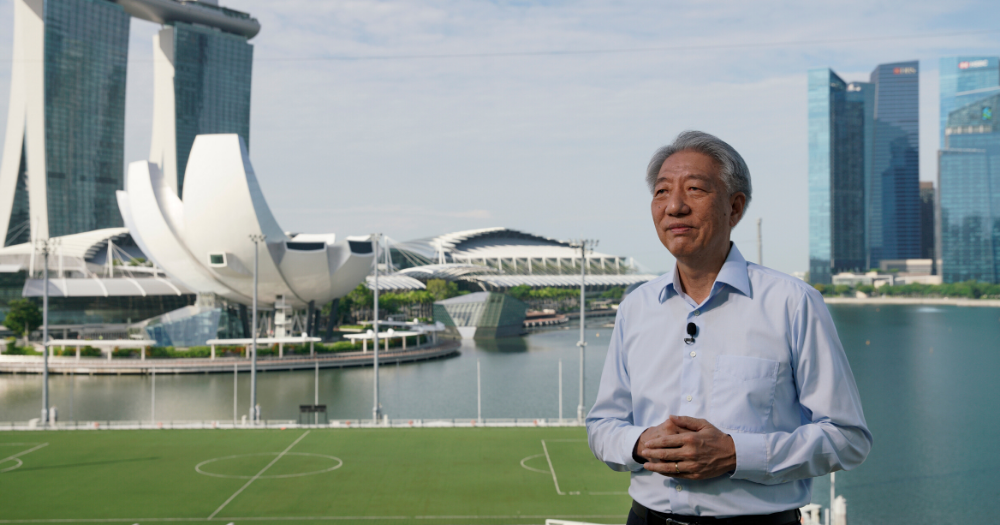Senior Minister Teo Chee Hean addressed the nation on the evening of June 11.
He is the third minister to do so in a series of scheduled national broadcasts.
The theme of Teo's broadcast is "Resilience in a Changing External Environment".
Tap on knowledge from SARS outbreak
As part of his speech, Teo talked about the challenges Singapore will face and gave an outline on how the government will build greater resilience to take care of Singaporeans and prepare for a "new, more uncertain world".
He shared that we could draw on the knowledge, expertise and capacity in the healthcare system after Singapore first experienced SARS in 2003.
Teo, who is Coordinating Minister for National Security, added: "We could tap the SAF (Singapore Armed Forces) to rapidly build up our contact tracing capacity, as we did during SARS."
Virus outbreak among migrant worker community 'major challenge'
Teo said that the Covid-19 crisis has been a stringent test of Singapore's ability and resolve to tackle challenges at home, and dealing with it required "an unprecedented Whole-of-Nation response".
He emphasised that no two crises are the same and pointed out that the virus outbreak in the migrant worker community has been a "major challenge".
In early April, National Development Minister Lawrence Wong announced that Teo was now advising the other ministers who are part of the multi-ministry task force handling the situation in the migrant worker dormitories.
Over the years, Teo has served as the Minister for Home Affairs, Minister for Defence, Minister for Education, and Minister for the Environment.
This is the first time Teo has addressed the issue since his appointment.
He also shared that they had heightened surveillance and tightened precautions in the migrant worker dormitories early on.
However, these measures proved to be insufficient as Covid-19 is far more infectious than SARS.
Teo added that they had "acted decisively" to isolate the dormitories when there were 26 cases of Covid-19 infection in the dormitories on April 4.
Unfortunately, the virus continued to spread.
"However, the infectiousness of this virus and the communal living conditions in the dormitories meant that in a fortnight, by April 20, we were recording more than 1,000 new cases per day in the dormitories," he said.
Accelerated plans for care facilities
He added that with the rising number of cases, they had anticipated the need for community care facilities.
Over the first few weeks of April, plans to build community care facilities were accelerated and scaled up to accommodate more cases.
"At the peak, on May 12, we were caring for close to 20,000 patients in our community care and similar facilities. This is more than the total number of beds in all of our public acute hospitals."
Teo said that they have mobilised resources including the public service, government-linked companies and the private sector to set up and run the facilities.
Healthcare volunteers also stepped forward to help man the facilities.
Calling it a tremendous effort, he said: "This is how we are able to take care of every patient without overwhelming our healthcare system and putting lives at risk."
Even though the virus outbreak wasn't something that the SAF and Home Team had specifically prepared and trained for, he shared that they demonstrated readiness and flexibility by stepping up to establish the Joint Task Forces (JTF) in a matter of days.
According to Teo, the JTFs played a "critical role" by deploying Forward Assurance and Support Teams to look after more than 300,000 workers in all the dormitories and supporting the Ministry of Health's (MOH) overall Medical Support Plan.
He also thanked the officers for their "extraordinary and selfless" contributions.
"It is a massive task, and our officers, from our entire whole-of-nation team, are doing a tremendous job."
Close ties with Malaysia and Indonesia
Separately, Teo touched on Singapore wanting to be a good partner and contributing to a harmonious region.
He said that Singapore will continue to actively promote close ties and good cooperation with ASEAN partners, especially Indonesia and Malaysia, to tackle the virus together.
"As a gesture of solidarity, we donated masks, test kits, and ventilators to Malaysia, Indonesia and other ASEAN countries. We are also working closely with ASEAN and other key partners to curb the transmission of the virus, and to limit the economic fallout on our region."
Additionally, he shared that the government is working closely with Malaysia on the cross-border flow of people and goods.
In March, Teo had a "good and productive call" with Malaysian Senior Minister Ismail Sabri.
They had been coordinating measures between the two countries to facilitate Malaysian workers to continue working in Singapore and the flow of goods amidst the virus outbreak.
Top image from MCI.
If you like what you read, follow us on Facebook, Instagram, Twitter and Telegram to get the latest updates.
